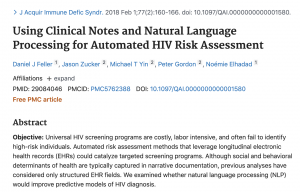DBMI Class of 2020 Profile: Daniel Feller, PhD

The burden of monitoring a diverse community of complex-care patients is overwhelming an already diminished population of primary-care physicians. Daniel Feller traveled his PhD journey through the Columbia Department of Biomedical Informatics (DBMI) with the intention of developing a tool that could both improve health care and reduce healthcare costs throughout the nation.
Feller had his hand in every aspect of a Complex Care Management (CCM) system that he believes could provide significant benefits to the healthcare community, but he knew it couldn’t be a one-person journey.
“I was really lucky to have a strong relationship with clinical collaborators,” said Feller, who earned his PhD in the DBMI Class of 2020. “I had a lot of independence. I could spend time with my advisors in DBMI, but I could also spend a lot of time figuring out important clinical questions with the infectious disease specialists. Every research question I addressed in my dissertation or researched throughout my time at DBMI came from my interactions with those clinicians.”
Those interactions actually began while he worked at the Department of Health. A Philosophy major as an undergrad, Feller found his passion for data science in a collegiate biostatistics course. That passion found a home when Feller started reading JAMIA frequently and found the most impactful research coming from the same place.
“All the coolest work came out of DBMI,” said Feller, noting this prediction paper on chronic kidney disease by Adler Perotte as an early inspiration. “The writing was clear, accessible, and the they were doing something nobody else is doing. That caught my attention, so I applied to Columbia.”
Collaborations with Peter Gordon, a Columbia infectious disease specialist, while at the Department of Health provided the foundation for several other crucial clinical relationships that were impactful on his research. He became close friends with Jason Zucker, whose collaborations within DBMI include the recently release COVIDWatcher app.
He received important guidance along the way from his co-advisors, Noémie Elhadad and Lena Mamykina. Their divergent focuses supported the complete journey of his work with the CCM tool.
“Noémie really goes deep on data science, and Lena focuses on how we present those insights from the data to the user,” Feller said. “It’s like full-stack informatics — how do we measure this, how do we generate insight from what we measure, and how do we present to end users? You can do it all at Columbia.”

While the CCM tool was the focus of his dissertation defense, Feller worked on other projects within DBMI. He served as lead author on a study that tried to predict who would get HIV through EHR data, and also collaborated with Mamykina on a visual analytics tool to help clinicians identify systematic and clinically meaningful patterns in patient-generated data.
The CCM tool was at the heart of his work, and that process began with a Research Methods class taught by Mamykina. Calling it a class that taught “the process of how to become a researcher,” Feller developed this concept of aiding doctors who simply needed more assistance than your standard EHR.
“My main contribution is informing the community on how doctors who have many patients can simultaneously monitor their patients across their panel,” Feller said. “Doctors are increasingly in short supply in primary care, and everybody says that good primary care is how we will decrease healthcare costs. We are going to actively monitor patients with chronic conditions. You can’t monitor that many patients with an EHR.”
In his first studies, he conducted interviews and observations in two HIV primary care programs and analyzed the data generated to create a conceptual framework of patient monitoring in CCM and identify challenges faced by clinicians in delivering CCM. Next, he used computational methods to advance the science of extracting from the patient record social and behavioral determinants of health (SBDH), which are not easily accessible to clinicians and represent an important barrier to CCM. Finally, he conducted user-centered design to better understand how interactive systems can support the management of large groups of patients by clinicians delivering CCM.
“I got significant exposure to data science, NLP, human-computer interaction,” Feller said. “Where else would I have gotten such a well-rounded education?”
That well-rounded education doesn’t happen without Feller’s dedication to working with all possible resources around him.
“Daniel worked closely with doctors and nurses at the division of Infectious Diseases,” Elhadad said. “His enthusiasm for research and his ability to capture and synthesize information needs of different stakeholders has been so beneficial to understanding and proposing informatics solutions to the complex task of managing populations of people living with HIV.”
Feller is looking forward to starting his position as Director of Analytics at Rightway Healthcare, but his work to enhance population monitoring in a clinical setting will be a legacy he is proud to leave at Columbia.


